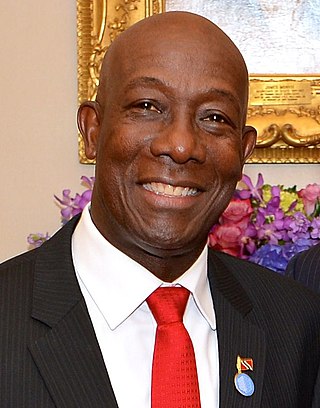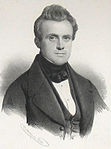
The House of Representatives is the lower house of the bicameral Parliament of Australia, the upper house being the Senate. Its composition and powers are set down in Chapter I of the Constitution of Australia.

Democrats 66 is a social liberal and progressive political party in the Netherlands, which is positioned in the centre of the political spectrum. It is a member of the Liberal International (LI) and the Alliance of Liberals and Democrats for Europe (ALDE).
A minority government, minority cabinet, minority administration, or a minority parliament is a government and cabinet formed in a parliamentary system when a political party or coalition of parties does not have a majority of overall seats in the legislature. It is sworn into office, with or without the formal support of other parties, enabling a government to be formed. Under such a government, legislation can only be passed with the support or consent of enough other members of the legislature to provide a majority, encouraging multi-partisanship. In bicameral legislatures, the term relates to the situation in the chamber whose confidence is considered most crucial to the continuance in office of the government.
The Protectionist Party, also known as the Protectionist Liberal Party or Liberal Protectionist Party, was an Australian political party, formally organised from 1887 until 1909, with policies centred on protectionism. The party advocated protective tariffs, arguing it would allow Australian industry to grow and provide employment. It had its greatest strength in Victoria and in the rural areas of New South Wales. Its most prominent leaders were Sir Edmund Barton and Alfred Deakin, who were the first and second prime ministers of Australia.
A snap election is an election that is called earlier than the one that has been scheduled. Snap elections in parliamentary systems are often called to resolve a political impasse such as a hung parliament where no single political party has a majority of seats, or when the incumbent prime minister is defeated in a motion of no confidence, or to capitalize on an unusual electoral opportunity or to decide a pressing issue, under circumstances when an election is not required by law or convention.

The 1996 Australian federal election was held to determine the members of the 38th Parliament of Australia. It was held on 2 March 1996. All 148 seats of the House of Representatives and 40 seats of the 76-seat Senate were up for election. The Liberal/National Coalition led by Opposition Leader John Howard of the Liberal Party and coalition partner Tim Fischer of the National Party defeated the incumbent Australian Labor Party government led by Prime Minister Paul Keating in a landslide victory. The Coalition won 94 seats in the House of Representatives, which is the largest number of seats held by a federal government to date, and only the second time a party had won over 90 seats at a federal election.

The South Australian House of Assembly is one of the two chambers of the Parliament of South Australia, the other being the Legislative Council. It sits in Parliament House in the state capital, Adelaide.

The 1963 Australian federal election was held in Australia on 30 November 1963. All 122 seats in the House of Representatives were up for election. The incumbent Liberal–Country coalition government, led by Prime Minister Sir Robert Menzies, won an increased majority over the opposition Labor Party, led by Arthur Calwell. This was the only time that a Federal Government won a seventh consecutive term in office.

General elections were held in Belgium on 11 April 1954. The dominant Christian Social Party won 95 of the 212 seats in the Chamber of Representatives and 49 of the 106 seats in the Senate. Voter turnout was 93.2%. Elections for the nine provincial councils were also held.

General elections were held in Belgium on 1 June 1958. The result was a victory for the Christian Social Party, which won 104 of the 212 seats in the Chamber of Representatives and 53 of the 106 seats in the Senate. Voter turnout was 93.6% in the Chamber election and 93.7% in the Senate election. Elections for the nine provincial councils were also held.

Full general elections were held in Belgium on 14 October 1894, with run-off elections held on 21 October 1894.
Full general elections were held in Belgium on 2 June, 1912.

Partial general elections were held in Belgium on 8 June 1847. The result was a victory for the new Liberal Association, which had been formed the previous year. It won 33 seats to the Catholics' 21, as the latter were split into dogmatic and liberal groups. Only 1% of the country's population was eligible to vote.

Partial general elections were held in Belgium on 8 June 1852. In the elections for the Chamber of Representatives the result was a victory for the Liberal Party, who won 57 of the 108 seats. Voter turnout was 69.2%, although only 42,053 people were eligible to vote.

General elections were held in Belgium on 11 August 1864, the first full general elections since 1857. The snap elections were called upon the loss of a parliamentary majority for the liberal government of Charles Rogier and a hung parliament, following the death of liberal representative Charles Cumont on 10 July 1864. In the last few parliamentary sessions preceding the elections, all Catholic members quit the Chamber, resulting in it not being quorate. The Chamber was disbanded by order of 16 July.

Partial general elections were held in Belgium on 8 June 1886. In the elections for the Chamber of Representatives the result was a victory for the Catholic Party, which won 98 of the 138 seats.

Partial general elections were held in Belgium on 14 June 1859. The result was a victory for the Liberal Party, which won 69 of the 116 seats in the Chamber of Representatives and 31 of the 58 seats in the Senate. Voter turnout was 55.9%, although only 49,672 people were eligible to vote.

Early general elections were held in Belgium on 2 August 1870, the second that year after the partial elections in June had ended with both the Catholic Party and the Liberal Party holding 61 seats each. The result was a victory for the Catholic Party, which won 72 of the 124 seats in the Chamber of Representatives and 34 of the 62 seats in the Senate. Voter turnout was 68%, although only 107,099 people were eligible to vote.

Legislative elections were held in Belgium in June and July 1884, for partial Chamber and full Senate elections respectively. Voter turnout was 79.1% in the Chamber of Representatives elections, although only 69,276 people were eligible to vote.

On Monday November 28, 2016, local elections were held in Trinidad, the bigger of the two main islands of Caribbean island state Trinidad and Tobago. The elections were held slightly more than one month later than originally planned. They were held to select the membership of 14 local authorities, with representatives elected from 137 single-member districts across the country. The entire membership of Trinidad's local government was renewed as a result of these elections, with the previous set of local representatives having been elected in 2013. The elections came roughly a year following the 2015 parliamentary general election.

















